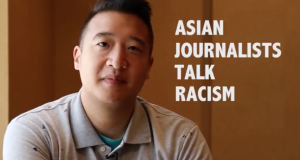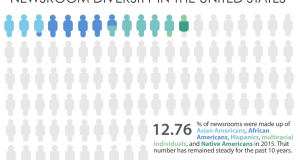The changing media landscape in China is creating a new environment for journalists pursuing a career overseas, as foreigners are being more accepted as reporters and social media is playing a role in undermining the government’s traditional censorship.
For Asian Americans, looking ethnically Asian may bring a competitive edge since Chinese viewers are identifying more with on-air talent who look local but talk foreign.
“Speaking fluent English, [knowing] American culture, but also looking Asian, they see that as something that’s attractive,” says Ramy Inocencio, a freelance reporter for CNN and The Wall Street Journal.
But other journalists say language skills are more important than looks.
“Because Hong Kong is that door to mainland China, there are a lot of opportunities for foreign journalists,” says Eldes Tran, a copy editor based in the city, but “usually they have the language skills.”
Wendy Tang, digital editor for Asia Society in Hong Kong, said looking like a local helps with approachability but ultimately they would hope a journalist would speak the same language. “Journalism is very language based, so if you’re able to communicate with your community, I don’t think race really matters.”
Citizen journalism is also emerging due to the country’s social media growth. As a result, the newsroom is increasingly monitoring social networks in China as a way of gathering information, finding sources and breaking news.
“Chinese citizens are very smart about using different ways to try to make a voice out of something,” Tang added, commenting on their creative ways around media censorship.
Of course, the Chinese government is also monitoring the burgeoning activity. It’s working on stopping the adaptation and spread of fast-developing social networks, like Sina and Weibo. Twitter and Facebook are already blocked, although there are ways around it.
Foreign journalists in China, like Tran, are interested to see how things will play out in the next few years as government officials grapple to find a way to censor social media activity activity. But government officials may be facing an uphill battle when dealing with a platform that has an inherent nature of instant virality and information disseminating quickly.
 VOICES Publishing from the AAJA National Convention
VOICES Publishing from the AAJA National Convention







